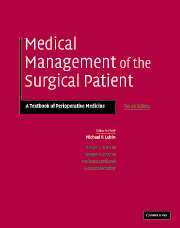Book contents
- Frontmatter
- Contents
- Editor biographies
- List of contributors
- Preface
- Introduction
- Part I Medical management
- 1 Anesthesia management of the surgical patient
- 2 Nutrition
- 3 Preoperative testing
- 4 Chronic medications around the time of surgery
- 5 Ethical considerations in the surgical patient
- 6 Cardiovascular disease
- 7 Postoperative chest pain and shortness of breath
- 8 Perioperative management of hypertension
- 9 Perioperative pulmonary risk evaluation and management for non-cardiothoracic surgery
- 10 Acute lung injury (ALI) and the acute respiratory distress syndrome (ARDS)
- 11 Postoperative pulmonary complications
- 12 Peptic ulcer disease
- 13 Liver disease
- 14 Inflammatory bowel disease
- 15 Postoperative gastrointestinal complications
- 16 Disorders of red cells
- 17 Assessment of bleeding risk in the patient with no history of hemostatic problems
- 18 Surgical issues affecting patients with hemotologic malignancies
- 19 Prophylaxis for deep venous thrombosis and pulmonary embolism in surgery
- 20 Blood transfusion/preoperative considerations and complications
- 21 Prevention of surgical site infections
- 22 Medical care of the HIV-infected surgical patient
- 23 Fever and infection in the postoperative setting
- 24 Surgery in the patient with renal disease
- 25 Postoperative electrolyte disorders
- 26 Diabetes mellitus
- 27 Disorders of the thyroid
- 28 Disorders of the adrenal cortex
- 29 Disorders of calcium metabolism
- 30 Pheochromocytoma
- 31 Rheumatologic diseases
- 32 Cerebrovascular disease
- 33 Management of the surgical patient with dementia
- 34 Neuromuscular disorders
- 35 Perioperative management of patients with Parkinson's disease
- 36 Delirium in the surgical patient
- 37 Surgery in the elderly
- 38 Obesity
- 39 Depression
- 40 Substance abuse
- 41 Care of the peripartum patient
- Part II Surgical procedures and their complications
- Index
- References
36 - Delirium in the surgical patient
Published online by Cambridge University Press: 12 January 2010
- Frontmatter
- Contents
- Editor biographies
- List of contributors
- Preface
- Introduction
- Part I Medical management
- 1 Anesthesia management of the surgical patient
- 2 Nutrition
- 3 Preoperative testing
- 4 Chronic medications around the time of surgery
- 5 Ethical considerations in the surgical patient
- 6 Cardiovascular disease
- 7 Postoperative chest pain and shortness of breath
- 8 Perioperative management of hypertension
- 9 Perioperative pulmonary risk evaluation and management for non-cardiothoracic surgery
- 10 Acute lung injury (ALI) and the acute respiratory distress syndrome (ARDS)
- 11 Postoperative pulmonary complications
- 12 Peptic ulcer disease
- 13 Liver disease
- 14 Inflammatory bowel disease
- 15 Postoperative gastrointestinal complications
- 16 Disorders of red cells
- 17 Assessment of bleeding risk in the patient with no history of hemostatic problems
- 18 Surgical issues affecting patients with hemotologic malignancies
- 19 Prophylaxis for deep venous thrombosis and pulmonary embolism in surgery
- 20 Blood transfusion/preoperative considerations and complications
- 21 Prevention of surgical site infections
- 22 Medical care of the HIV-infected surgical patient
- 23 Fever and infection in the postoperative setting
- 24 Surgery in the patient with renal disease
- 25 Postoperative electrolyte disorders
- 26 Diabetes mellitus
- 27 Disorders of the thyroid
- 28 Disorders of the adrenal cortex
- 29 Disorders of calcium metabolism
- 30 Pheochromocytoma
- 31 Rheumatologic diseases
- 32 Cerebrovascular disease
- 33 Management of the surgical patient with dementia
- 34 Neuromuscular disorders
- 35 Perioperative management of patients with Parkinson's disease
- 36 Delirium in the surgical patient
- 37 Surgery in the elderly
- 38 Obesity
- 39 Depression
- 40 Substance abuse
- 41 Care of the peripartum patient
- Part II Surgical procedures and their complications
- Index
- References
Summary
Introduction
The acute confusional state known as delirium is the most common cause of altered mental status in surgical patients. Despite its common occurrence, delirium can often go unrecognized, leading to delays in treatment. This can have significant implications as patients with delirium suffer from higher mortality, postoperative complication rates, longer lengths of stay and delayed functional recovery.
Delirium is usually acute in onset but may develop gradually. It can persist for hours to days and can fluctuate throughout the course of a day. The cardinal feature of delirium is an alteration in the level of consciousness that fluctuates over time. Patients may also display hyperalert, irritable, or agitated behavior. The sleep–wake cycle is often markedly disrupted. Sleep is usually fragmented, with restlessness and agitation. Psychomotor abnormalities may range from hyperactivity to lethargy, stupor, obtundation, and catatonia. Most cases of delirium improve or resolve within 1 to 4 weeks if sufficient attention is given to correcting the underlying disorder causing the cerebral dysfunction. Nonetheless, the development of delirium serves as a marker for those patients at risk of progressive functional decline.
Multiple signs and symptoms may accompany delirium. Patients may be grossly psychotic with severe perceptual distortions that can include hallucinations (tactile, auditory, visual, olfactory), paranoia, delusions, thought disorganization and language incoherence resembling schizophrenia. Signs of cognitive dysfunction such as disturbances in memory, attention, concentration, and orientation are usually the first to be recognized. Behavioral abnormalities such as agitation, disinhibition, and combativeness may also occur.
- Type
- Chapter
- Information
- Medical Management of the Surgical PatientA Textbook of Perioperative Medicine, pp. 439 - 444Publisher: Cambridge University PressPrint publication year: 2006

